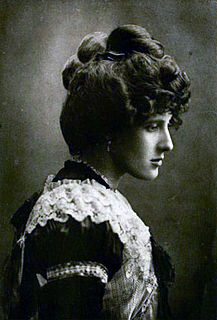 W
WJudith Anne Dorothea Blunt-Lytton, 16th Baroness Wentworth, also known as Lady Wentworth, was a British peer, Arabian horse breeder and real tennis player. As the owner of the Crabbet Arabian Stud from 1917 to 1957, her influence on Arabian horse breeding was profound, with over 90 percent of all Arabian horses in the world today carrying lines to Crabbet bloodstock in their pedigrees.
 W
WAbbas Helmy I of Egypt was the Wāli of Egypt and Sudan. He was a son of the Albanian Tusun Pasha, and a grandson of the Albanian Muhammad Ali, founder of the reigning Muhammad Ali Dynasty of Egypt and Sudan. The Chambers Biographical Dictionary says of him: "[b]igoted and sensual, he did much to undo the progress made under Muhammad Ali."
 W
WBiddesden House is a Grade I listed English country house in the parish of Ludgershall, Wiltshire. It is home to an Arabian Horse stud farm.
 W
WWilfrid Scawen Blunt, sometimes spelled Wilfred, was an English poet and writer. He and his wife, Lady Anne Blunt travelled in the Middle East and were instrumental in preserving the Arabian horse bloodlines through their farm, the Crabbet Arabian Stud. He was best known for his poetry, which was published in a collected edition in 1914, but also wrote a number of political essays and polemics. Blunt is also known for his views against imperialism, viewed as relatively enlightened for his time.
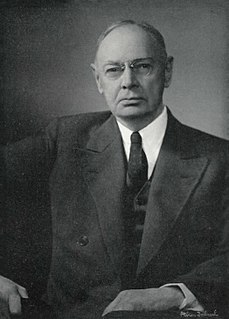 W
WWilliam Robinson "W. R. " Brown was an American corporate officer of the Brown Company of Berlin, New Hampshire. He was also an influential Arabian horse breeder, the founder and owner of the Maynesboro Stud, and an authority on Arabian horses.
 W
WRobert Byerley (1660–1714), of Middridge Grange, Heighington, county Durham, and Goldsborough, Yorkshire, was an English soldier and Tory politician who sat in the English and British House of Commons between 1685 and 1714. He is credited with capturing the Byerley Turk, a famous stallion considered one of the three major foundation sires of the Thoroughbred breed of race horse.
 W
WPrince Nicholay Borisovich Shcherbatov, born on 22 January 1868 in Tsarskoe Selo, and died on 29 June 1943 in Starnberg, Bavaria. He was a Russian politician and served as the minister of the Interior from 5 June 1915 to 26 September 1915.
 W
WThe Crabbet Arabian Stud, also known as the Crabbet Park Stud, was a horse breeding farm established on 2 July 1878 when the first Arabian horses brought to England by Wilfrid Scawen Blunt and Lady Anne Blunt arrived at Crabbet Park, their estate in Sussex. Six months earlier, while staying in Aleppo, Wilfrid and Lady Anne had made a plan to import some of the best Arabian horses to England and breed them there. In Lady Anne's words, "it would be an interesting and useful thing to do and I should like much to try it."
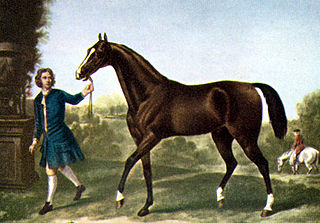 W
WThomas Darley served as Her Majesty's Consul to the Levant (Syria) during the reign of Queen Anne. He is famous for having bought an Arabian colt that became an important part of the history of the Thoroughbred breed.
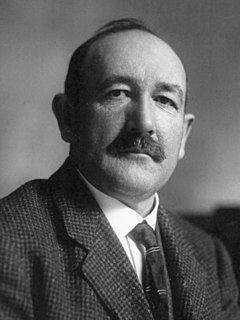 W
WHomer Calvin Davenport was a political cartoonist and writer from the United States. He is known for drawings that satirized figures of the Gilded Age and Progressive Era, most notably Ohio Senator Mark Hanna. Although Davenport had no formal art training, he became one of the highest paid political cartoonists in the world. Davenport also was one of the first major American breeders of Arabian horses and one of the founders of the Arabian Horse Club of America.
 W
WSusan Melody George is an English film and television actress.
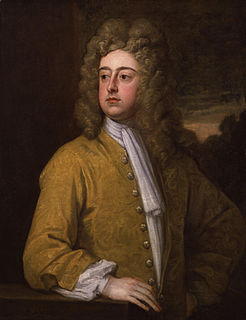 W
WFrancis Godolphin, 2nd Earl of Godolphin,, styled Viscount Rialton from 1706 to 1712, was an English courtier and politician who sat in the English and British House of Commons between 1695 and 1712, when he succeeded to the peerage as Earl of Godolphin. Initially a Tory, he modified his views when his father headed the Administration in 1702, and was eventually a Whig. He was a philanthropist and one of the founding governors of the Foundling Hospital in 1739.
 W
WWill Keith Kellogg, generally referred to as W.K. Kellogg, was an American industrialist in food manufacturing, best known as the founder of the Kellogg Company, which to this day produces a wide variety of popular breakfast cereals. He was a member of the Seventh-day Adventist Church and practiced vegetarianism as a dietary principle taught by his church. Later, he founded the Kellogg Arabian Ranch and made it into a renowned establishment for the breeding of Arabian horses. Kellogg started the Kellogg Foundation in 1934 with $66 million in Kellogg company stock and investments, a donation that would be worth over a billion dollars in today's economy. Kellogg continued to be a major philanthropist throughout his life.
 W
WLieutenant-Colonel Noel Anthony Scawen Lytton, 4th Earl of Lytton was a British Army officer, Arabian horse fancier and writer.
 W
WSimon Charles Pendered MacCorkindale was an English actor, film director, writer and producer. He spent much of his childhood moving around due to his father serving as an Officer with the Royal Air Force. Poor eyesight prevented him following a similar career in the RAF, so he instead planned to become a theatre director. Training at the Theatre of Arts in London, he started work as an actor, making his West End debut in 1974. He went on to appear in numerous roles in television, including the series I, Claudius and Jesus of Nazareth, before starring as Simon Doyle in the film Death on the Nile (1978). This proved to be a breakthrough role and allowed him to move to the United States, where he appeared in a variety of films and TV series including Quatermass (1979), The Riddle of the Sands (1979), The Sword and the Sorcerer (1982) and Jaws 3-D (1983).
 W
WThe Marbach Stud, German: Haupt- und Landgestüt Marbach, is Germany's oldest state stud farm for horse breeding, has a history that dates back over 500 years. It is located in southwest Germany near Gomadingen in the Reutlingen district of Baden-Württemberg. The annual stallion parade is an internationally known attraction, and the stud hosts over 500,000 visitors per year. The stud also offers courses for those wishing to learn to ride or drive, as well as an instructor training program. Marbach is known for producing athletic horses with good temperaments, and has careful management practices, including that of allowing young, untrained horses the opportunity to grow in a natural setting conducive to their mental as well as their physical development.
 W
WCarson Wayne Newton is an American singer and actor. One of the best-known entertainers in Las Vegas, Nevada, he is known by the nicknames The Midnight Idol, Mr. Las Vegas and Mr. Entertainment. His well known songs include 1972's "Daddy, Don't You Walk So Fast", "Years" (1980), and his vocal version of "Red Roses for a Blue Lady" (1965). His signature song "Danke Schoen" (1963) was notably used in the score for Ferris Bueller's Day Off (1986).
 W
WCount Alexei Grigoryevich Orlov was a Russian soldier and statesman, who rose to prominence during the reign of Catherine the Great.
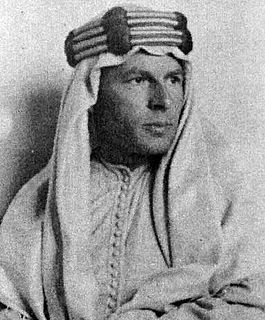 W
WCarl Reinhard Raswan, born Carl Reinhard Schmidt, was one of the greatest connoisseurs and patrons of the asil Arabian horse. He authored numerous books on Arabian horses and the Bedouin people who raised them. A scholar of Arabian bloodlines, he also published the Raswan Index, an extensive compilation of Arabian horse pedigree and strain information. He advocated tolerance and understanding of Bedouin ways of life and culture in Arabia.
 W
WAli Pasha Mohamed Sherif was an Egyptian government official and a renowned breeder of Arabian horses during the late 19th century.
 W
WSheila Varian was a breeder of Arabian horses who lived and worked at the Varian Arabians Ranch near Arroyo Grande, California. She grew up with a strong interest in horses, and was mentored in horsemanship by Mary "Sid" Spencer, a local rancher and Morgan horse breeder who also introduced Varian to the vaquero or "Californio" tradition of western riding. She started her horse ranch, Varian Arabians, in 1954 with the assistance of her parents. Raising and training horses was her full-time occupation beginning in 1963. She used vaquero-influenced methods of training horses, although she adapted her technique over the years to fit the character of the Arabian horse, which she viewed as a horse breed requiring a smart yet gentle approach.
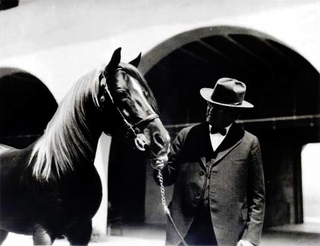 W
WThe W. K. Kellogg Arabian Horse Center is a research facility on the campus of the California State Polytechnic University, Pomona which specializes on equine studies, breeding and research.
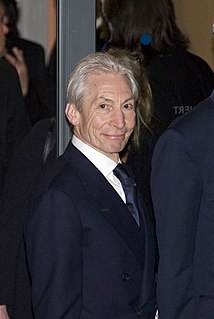 W
WCharles Robert Watts is an English drummer, best known as a member of the Rolling Stones since 1963. Originally trained as a graphic artist, he started playing drums in London's rhythm and blues clubs, where he met Brian Jones, Mick Jagger, and Keith Richards. In January 1963, he joined their fledgling group, the Rolling Stones, as drummer, while doubling as designer of their record sleeves and tour stages. Watts has been the only Rolling Stones member other than Jagger or Richards to have been featured on all of their studio albums. He cites jazz as a major influence on his drumming style. He has toured with his own group, the Charlie Watts Quintet, and appeared in London at Ronnie Scott's Jazz Club with the Charlie Watts Tentet.
 W
WAnne Isabella Noel Blunt, 15th Baroness Wentworth, known for most of her life as Lady Anne Blunt, was co-founder, with her husband the poet Wilfrid Blunt, of the Crabbet Arabian Stud in England and the Sheykh Obeyd estate near Cairo. The two married on 8 June 1869. From the late 1870s, Wilfrid and Lady Anne travelled extensively in Arabia and the Middle East, buying Arabian horses from Bedouin tribesmen and the Egyptian Ali Pasha Sherif. Among the great and influential horses they took to England were Azrek, Dajania, Queen of Sheba, Rodania and the famous Ali Pasha Sherif stallion Mesaoud. To this day, the vast majority of purebred Arabian horses trace their lineage to at least one Crabbet ancestor.
 W
WThe Yeguada Militar de Jerez de la Frontera, known outside Spain as the Yeguada Militar, is a military Spanish stud farm headquartered in Andalusia, Spain, dedicated to horse breeding of purebred Andalusian horses and Arabian horses. Founded in 1847, it became the state military stud farm in 1893. In the 20th century, as need for cavalry horses declined, the stud's emphasis shifted to become a genetic reservoir to preserve the bloodlines of the Pure Spanish Horse and to continue to breed high quality Arabian horses, with stallions of both breeds being made available to private horse breeders to improve the horses of Spain. Today, there are two facilities located in the Jerez de la Frontera area, one primarily for stallions, the other for mares and foals, as well as multiple stallion depots across the country.